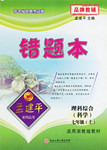


 孟建平错题本系列答案
孟建平错题本系列答案 超能学典应用题题卡系列答案
超能学典应用题题卡系列答案科目:高中英语 来源:2012-2013学年广东省广州六中高二上学期期末考试英语试卷(带解析) 题型:填空题
单词考查 (共10小题,满分20分)
【小题1】He was found in ____________(拥有) of drugs and was accused.
【小题2】To t_____________(改造)hills into fields is an extremely tough job.
【小题3】It was a long journey, but we e____________ (最终) arrived at the small village before dark.
【小题4】He was b_______ from driving for three months owing to rushing red lights.
【小题5】The door opens and closes _____________(自动地).
【小题6】Whatever you do, you’ve to take the possible c_____________.
【小题7】The rise in carbon dioxide is causing a s__________(持续)increase in global warming.
【小题8】Try to use e____________ friendly materials to consume less energy.
【小题9】There’s a lot of a__________(焦虑)among the staff about job losses.
【小题10】In autumn, the temperature in this city v_______ from 10c to 30c in a day.
查看答案和解析>>
科目:高中英语 来源:2016届福建省福州市八县高一上学期期末考试英语试卷(解析版) 题型:单词拼写
根据首字母或汉语提示写出正确的单词.补全下列各句
1.Few birds managed to s________ the winter last year.
2.The Amber Room was also a treasure _______ (装饰) with gold and jewels.
3.The community service needs many v________, who are willing to help without pay.
4.Andy seems to be __________(发信号) to his teammates in computer language..
5.If you really like the job, __________(距离)is not a problem.
6.It was a great r_________ to find that my family was all safe.
7.I p__________ didn’t believe what he said at the meeting.
8.The tourists were ________ (讨价还价) with the man over the price.
9.It’s reported that Kobe has b_________ up with his wife.
10.The internet games are a________ to some young people.
查看答案和解析>>
科目:高中英语 来源:2013-2014学年福建省高三上学期第一次月考英语试卷(解析版) 题型:阅读理解
When Scotsman Alexander Graham Bell invented the telephone in 1876, it was a revolution in communication. For the first time, people could talk to each other over great distances almost as clearly as if they were in the same room. Nowadays, though, we increasingly use Bell’s invention for taking photographs, accessing the internet, or watching video clips, rather than talking. Over the last two decades a new means of spoken communication has appeared: the mobile phone.
The first real mobile telephone call was made in 1973 by Dr Martin Cooper, the scientist who invented the modem mobile handset(手机). Within a decade, mobile phones became available to the public. The streets of modem cities began to feature sharp-suited characters shouting into giant plastic bricks. In Britain the mobile phone quickly became the same with the “yuppie”, the new type of young urban professionals who carried the expensive handsets as status symbols. Around this time many of us said that we would never own a mobile phone.
But in the mid-90s, something happened. Cheaper handsets and cheaper calling rates meant that, almost overnight, it seemed that everyone had a mobile phone. And the giant plastic bricks of the 80s had changed into smooth little objects that fitted nicely into pockets and bags.
Moreover, people’s timekeeping changed. Younger readers will be amazed to know that, not long ago, people made spoken arrangements to meet at a certain place at a certain time. But later Meeting time became approximate under the new order of communication: the Short Message Service (SMS) or text message. Going to be late? Send a text message! It takes much less effort than arriving on time, and it’s much less awkward than explaining your lateness face to face and the text message has changed the way we write in English. Traditional rules of grammar and spelling are much less important when you’re sitting on the bus, hurriedly typing “Will B 15mm late - C U @ the bar. Sorry! -).”
Alexander Graham Bell would be amazed if he could see how far the science of telephony has progressed in less than 150 years. If he were around today, he might say “That’s gr8! But I’m v busy rite now. Will call U 2nite.”
1.What does the underlined part in Para.2 refer to?
A. Houses of modern cities. B. Sharp-suited characters.
C. New type of professionals. D. Mobile phones.
2.According to Paragraph 4, why did Meeting time become approximate?
A. People were more likely to be late for their meeting.
B. SMS made it easier to inform each other.
C. Young people don’t like unchanging things.
D. Traditional customs were dying out.
3.If you want to meet your friend at the school gate this evening, which of the following message can you send him?
A. Call U@ SKUg8 2nite. B. IM2BZ2CU 2nite.
C. CU@ the bar g8 2nite. D. W84U@ SKUg8 2nite.
4.What does the passage mainly tell us about?
A. Alexander Graham’s invention.
B. SMS as a new way of communication.
C. New functions of the mobile telephone.
D. The development of the mobile phone.
查看答案和解析>>
科目:高中英语 来源:2013-2014学年湖北省等三校高三11月联考英语试卷(解析版) 题型:完型填空
A flock of wild ducks were flying in formation, heading south for the winter. They formed a beautiful V in the sky, and were admired by everyone who saw them from below.
One day, Wally, one of the wild ducks in the formation, spotted something on the ground. It was a barnyard with a flock of _ ducks who lived on the farm. They were waddling around on the ground, quacking merrily and eating _ that was thrown on the ground for them every day. Wally liked what he saw. "It sure would be nice to have some of that corn," he thought to himself. "And all this flying is very tiring. I'd like to just __ around for a while."
So after thinking it over a while, Wally left the formation of wild ducks, made a sharp __ , and for the barnyard. He landed _ the tame ducks, and began to waddle around and quack . He also started eating corn. The formation of wild ducks continued their journey South, but Wally didn't care. "I'll __ them when they come back North in a few months," he said to himself.
Several months went by and __ enough, Wally looked up and spotted the flock of wild ducks in formation, heading north. They looked beautiful up there. And Wally was tired of the . It was muddy and he waddled, there was nothing but duck doo. "It's time to leave." said Wally.
So Wally _ his wings furiously and tried to get airborne. But he had gained some from all his corn-eating, and he hadn't exercised his wings much either. He finally the ground, but he was flying too _ and slammed into the side of the barn. He fell to the ground with a thud and said to himself, "Oh, well, I'll just wait until they fly __ in a few months. Then I'll rejoin them and become a wild duck again."
When the flock flew overhead once more, Wally again tried to himself out of the barnyard. But he simply didn't have the strength. Every winter and every spring, he saw his wild duck friends flying overhead, and they would to him. But his attempts to leave were all .
Eventually Wally no longer paid any attention to the wild ducks flying overhead. He hardly even noticed them. He had , become a barnyard duck.
1.A. tame B. ugly C. beautiful D. wild
2.A. food B. grain C. corn D. vegetable
3.A. rest B. waddle C. walk D. fly
4.A. turn B. dive C. land D. circle
5.A. hurried B. looked C. left D. headed
6.A. between B. among C. behind D. within
7.A. loudly B. sadly C. merrily D. eagerly
8.A. see B. recognize C. leave D. rejoin
9.A. strange B. lucky C. sure D. natural
10.A. barnyard B. corn C. waddling D. quacking
11.A. every day B. every time C. everywhere D. nowhere
12.A. flapped B. spread C. removed D. opened
13.A. strength B. skills C. friends D. weight
14.A. got off B. got to C. got up D. got back
15.A. slowly B. fast C. high D. low
16.A. back B. south C. north D. overhead
17.A. lift B. fly C. struggle D. rise
18.A. call out B. come back C. come over D. call back
19.A. in return B. in need C. in vain D. in place
20.A. after all B. above all C. therefore D. however
查看答案和解析>>
科目:高中英语 来源:2014届广东省高二上学期期末考试英语试卷(解析版) 题型:单词拼写
单词考查 (共10小题,满分20分)
1.He was found in ____________(拥有) of drugs and was accused.
2.To t_____________(改造)hills into fields is an extremely tough job.
3.It was a long journey, but we e____________ (最终) arrived at the small village before dark.
4.He was b_______ from driving for three months owing to rushing red lights.
5.The door opens and closes _____________(自动地).
6.Whatever you do, you’ve to take the possible c_____________.
7.The rise in carbon dioxide is causing a s__________(持续)increase in global warming.
8.Try to use e____________ friendly materials to consume less energy.
9.There’s a lot of a__________(焦虑)among the staff about job losses.
10.In autumn, the temperature in this city v_______ from 10c to 30c in a day.
查看答案和解析>>
湖北省互联网违法和不良信息举报平台 | 网上有害信息举报专区 | 电信诈骗举报专区 | 涉历史虚无主义有害信息举报专区 | 涉企侵权举报专区
违法和不良信息举报电话:027-86699610 举报邮箱:58377363@163.com